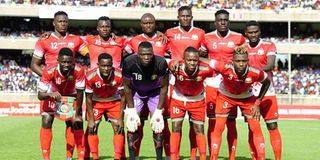What happened to Kenya’s great soccer record?

Harambee Stars players pose for photos before their Africa Cup of Nations group match against Walya Entelope of Ethiopia on October 14, 2018 at Moi International Sports Centre. Harambee Stars needs to reclaim its lost glory. PHOTO | FILE | NATION MEDIA GROUP
What you need to know:
- For most of Kenya’s observers are on the side of the one or the other of the two Manchester clubs, City and United.
Through the world’s print media habit of self-congratulation, official Kenya may claim one of these days that ours is among the world’s most formidable soccer playing nations.
Thus, since political independence, our Government has sunk a great deal of the taxpayer’s money into a ministry whose portfolio, we are told, is to promote sports.
It is a good reply. But for most Kenyans, that claim poses one significant question. How did the leaders of our country’s sporting organisations and the relevant Ministry welcome the page one headline “It’s Man City again!”, which the Daily Nation even offered in the reverse form (white against black) way above the page one masthead of its May 13 number)?
Because I am a Manchester City fan, I was deeply divided about it.
PRIDE
Therefore, the only reason I revisit the subject is that once upon a time Kenya was among the world’s most feared sporting nations.
For long ages, we were officially even told that Kenya were among the world’s soccer giants.
It is, of course, true that most Kenyans are intensely interested in association football (the official name of the sport that England once invented and transported throughout the world through its colonising activities), a game known to most people only as “soccer” (pronounced something like socker or (among peoples whose languages are phonetic) even like soka.
Might it not, however, be because football entails a great deal of Socking?
And what on earth happened to Kenya’s own once internationally recognised sporting potentials?
LEGENDS
Why doesn’t the country that once produced an Arere Anentia, a Joe Kadenge, a Kipchoge Keino and a Nyandika Maiyoro shine any more in international stadiums?
Why does Kenya now not produce any name that can do us really proud, including through the world’s electronic media?
Yet, since independence, we have regularly appointed a steeply expensive ministry allegedly to promote sports.
Officially, we originally seemed acutely convinced that we would bag shining gold from just about every sport.
By reversing the tone (white against black) of a pointer headline above the page-one masthead of its May 13 edition, the Nation’s sub-editors seemed to be consciously posing that very same question.
MARKET
However, wouldn’t it enthuse Kenya’s newspaper readers much more if one day they woke up to read in a Nairobi newspaper a page-one headline story about Kenya’s national soccer side having trounced their English or French or Italian or Spanish or Swedish counterparts?
It was not through any prejudice, I guess, that the Nation’s editors put the story on page one.
Most probably, they did so only because the Nation has a very highly developed sense of “what will sell”.
For most of Kenya’s observers are on the side of the one or the other of the two Manchester clubs, City and United.
The question, then, is this: is there any affair of Kenya’s ruling party from which every other Kenyan is obliged to refrain?
VALUES
Through a headline such as I have just quoted, that question might invade every sensitive mind among our newspaper readers.
Those are the ideas that pundits of commercial newspaper production will recommend, but only so long as they are provocatively attractive, correct and put in polite language.
To sum it up, then, accuracy of the information, detail, correctness and beauty of the language that you use to impart it are what will sell your piece.
That is why, the whole world over, those are what a good sub-editor will demand from every reporter and from every outside contributor to your newspaper.





